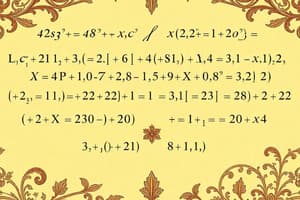Podcast
Questions and Answers
What are the roots of a quadratic equation in the form $ax^2 + bx + c = 0$ called?
What are the roots of a quadratic equation in the form $ax^2 + bx + c = 0$ called?
- Integers
- Solutions (correct)
- Variables
- Factors
What is the standard form of a quadratic equation?
What is the standard form of a quadratic equation?
- $x^2 - 2px + q = 0$
- $x^2 + 2x - 1 = 0$
- $cx^2 - x - 5 = 0
- $ax^2 + bx + c = 0$ (correct)
What does the discriminant of a quadratic equation determine?
What does the discriminant of a quadratic equation determine?
- The sum of the roots
- The product of the roots
- The number of real roots
- The nature of the roots (correct)
In a quadratic equation, when the discriminant is negative, what can be said about the roots?
In a quadratic equation, when the discriminant is negative, what can be said about the roots?
Flashcards are hidden until you start studying
Study Notes
Quadratic Equations
- The roots of a quadratic equation in the form $ax^2 + bx + c = 0$ are called solutions or zeros.
- The standard form of a quadratic equation is $ax^2 + bx + c = 0$, where $a$, $b$, and $c$ are constants, and $a ≠ 0$.
Discriminant of a Quadratic Equation
- The discriminant of a quadratic equation is a value that determines the nature of the roots.
- The discriminant is represented by the symbol $Δ$ (delta) and is calculated as $b^2 - 4ac$.
- The discriminant determines the number and nature of the roots of a quadratic equation.
Nature of Roots
- When the discriminant is negative, the roots of the quadratic equation are complex and non-real.
- In this case, there are no real solutions to the equation.
Studying That Suits You
Use AI to generate personalized quizzes and flashcards to suit your learning preferences.



